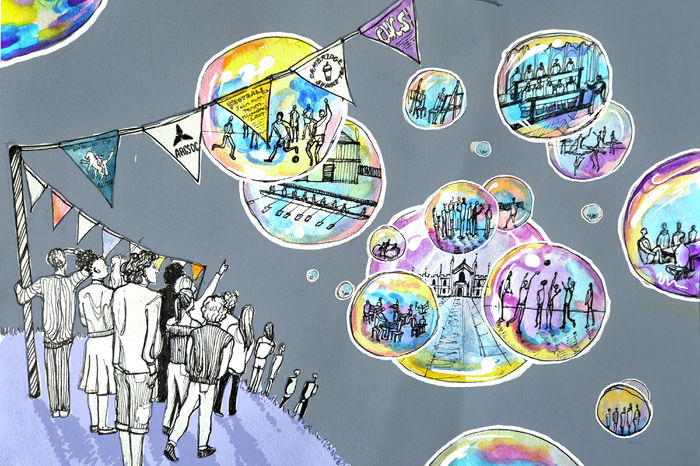Let’s bring back masks
Ellana Cowan argues that the benefits of masking for disabled students mean that we shouldn’t drop the practice

I am about to propose something potentially unpopular: this Freshers’ Week, let’s bring back masks. I know for many, this invites unwelcome memories of lockdown and the subsequent banana bread-fuelled descent into madness. However, if we can put these associations aside, during Freshers’, a time notorious for the spread of illnesses, masking up seems like a sensible step to take.
I am not suggesting students go clubbing donning masks. Instead, I propose that students who feel unwell but still wish to attend lectures wear masks (provided they are medically able to do so).
This is not to say that lectures are to blame for the spread of freshers’ flu. However, unlike the social aspects of university, they are not something those who do not wish to be struck with the illness can avoid.
“This discussion isn’t over for many immunocompromised students”
To most, for whom freshers’ flu is a minor inconvenience (at worst, a couple of days in bed), this may seem like an overreaction. However, for some of us immunocompromised students, the consequences of becoming unwell are far more serious. We are not able to shake off illnesses as quickly; even a simple cold can turn into something more serious. At the start of sixth form, I caught the cold that was going around. Most of my friends recovered within a week; it took me nearly six.
Colds and flus also compound the challenges of chronic illness. Many of us are familiar with the fatigue and disorientation of a bad cold. Imagine adding this to the debilitating fatigue, the kind that makes showering feel like running a marathon, and the pre-existing brain fog that chronically ill students deal with daily. Now add adjusting to the Cambridge workload, a constant stream of deadlines, acclimatising to a new environment, and the sudden disappearance of our home support system. When this is the reality for immunocompromised students, it is understandable why we are so fearful of freshers’ flu.
“Masking for the protection of others is not a new idea”
I was cautious during my Freshers’, only attending a couple of events. This was a simple, albeit isolating, step I could take: avoid crowded spaces to lower my chances of falling ill before the rigours of the academic year even started. What I could not avoid were my lectures. I remember my first couple, sitting in the back of the packed room, my masked face drawing curious looks. I can’t recall the lectures’ content. What I do remember is flinching as every new cough sounded from amongst the sea of students crammed into too small a space. I didn’t go to another lecture for the rest of that term. Instead, I relied on the recordings, the cacophony of coughs and sniffles on the video scaring me off attending.
During lockdown, there were fierce debates about whether students were missing out due to online lectures, with regard to both their role in the university experience, as well as the educational benefits of in-person attendance. This discussion isn’t over for many immunocompromised students.
It could be argued that it is the vulnerable party’s responsibility to protect themselves by masking up. I assure you, I will be wearing a mask, as will most other immunocompromised students. However, as was common knowledge during the pandemic, masking is more effective if both those who are unwell and those who are vulnerable wear masks.
As a society, we have already decided it is each individual’s responsibility to protect others from the potential harmful impact of their presence. In the case of smoking, we have gone as far as to legislate it, banning smoking indoors. Imagine if individuals could smoke indoors, and it was up to the rest of us to either mask up around them or avoid going inside. This, of course, is a bizarre scenario. Why is it any different for masking when ill? After all, masking for the protection of others is not a new idea. In some countries, it is a long-established practice to wear a mask when feeling unwell, out of respect for others’ wellbeing, immunocompromised or not.
I feel anxious even writing this piece. There seems to be an overwhelming emotional response to masking, with those who still choose to mask often being told it is time to move on from Covid. But masking isn’t about Covid. It is simply the case that, for the immunocompromised population, masks are an incredibly useful tool to help defend against the risks that come with our suppressed immune systems. It would mean a lot if our allies helped us by adopting this tool as well.
 News / Colleges charge different rents for the same Castle Street accommodation2 March 2026
News / Colleges charge different rents for the same Castle Street accommodation2 March 2026 News / News in Brief: waterworks, wine woes, and workplace wins 1 March 2026
News / News in Brief: waterworks, wine woes, and workplace wins 1 March 2026 News / Climate activists protest for ‘ethical careers policy’1 March 2026
News / Climate activists protest for ‘ethical careers policy’1 March 2026 News / Angela Merkel among Cambridge honorary degree nominees27 February 2026
News / Angela Merkel among Cambridge honorary degree nominees27 February 2026 News / Private school teacher who lied about Cambridge degree barred from teaching27 February 2026
News / Private school teacher who lied about Cambridge degree barred from teaching27 February 2026









